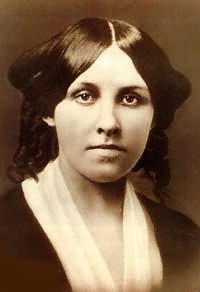Oh, how I love Little Women!
Louisa May Alcott’s 1868 novel is, of course, a mainstay of young adult novels, especially revered by (but not only by) girls. A heartwarming tale of a close-knit group of sisters and their mother (Marmee), the novel is captivating, compelling, engrossing.
But Little Women is so much more than an early example of “chick lit,” and if you know something of Alcott’s background, the novel takes on much more resonance.
Louisa May Alcott’s father was the famous Transcendentalist Bronson Alcott. Admired by many as a visionary, scoffed at by just as many as a kook, Alcott founded a utopian commune of sorts – Fruitlands. The experiment failed miserably, but it helped to shape his daughter’s view of the world. She saw her father earnestly put into practice his lofty ideals.
Bronson Alcott also pioneered key innovations in both children’s education and adult education. His Temple School in Boston was the first school in the United States to offer kindergarten, thanks in large part to his colleague, Elizabeth Palmer Peabody. And intellectual and creative luminaries gathered in Concord, Massachusetts, at his School of Philosophy each summer.
The school was located just behind the Alcotts’ home, which in turn was located just down the road from Ralph Waldo Emerson’s home. If you ever get a chance to go to Concord, a tour of Orchard House and the School of Philosophy is definitely in order. In the meantime, you can enjoy a virtual tour of the house. It is inspiring indeed to see where the Alcotts lived – and to see the real-life model for the March home in Little Women.
It was in this rich sea of heady intellectualism that Louisa May Alcott grew up. She’d go blueberry picking with Henry David Thoreau and borrow books from Emerson. And because her family was deeply involved in the abolitionist movement, she would also help conceal runaway slaves, since the Alcott home was on the Underground Railroad.
A true daughter of the Transcendentalists, Alcott espouses some of their views in Little Women – but it’s possible that some of the transformative messages get lost as well. Much critical controversy has centered on whether Little Women reinforces gender stereotypes or rejects them in favor of an early feminist approach. Scholar Ann B. Murphy sums up the debate this way:
Is Little Women adolescent, sentimental, and repressive, an instrument for teaching girls how to become ‘little,’ domesticated, and silent? Is the novel subversive, matriarchal, and implicitly revolutionary, fostering discontent with the very model of female domesticity it purports to admire?
You can learn more about these opposing views at the Little Women WebQuest on the American Transcendentalism website I developed with my students at Shepherd College.
Ready to read (or reread) Little Women? Project Gutenberg has a free, online version – but this may be one book you want in hard copy so you can curl up in your favorite armchair and read it with a cup of tea, preferably on a cozy, rainy day. Just about any edition will do, but this paperback Barnes & Noble Classics Series edition definitely fits the bill. And if you’re looking for a good movie version, check out director Gillian Armstrong’s 1994 adaptation starring Winona Ryder as Jo March.
Want to explore Alcott and her work even more fully? Check out The Portable Louisa May Alcott, which features a sampling of her short fiction, novels and novellas, memoirs, journals, and letters (including her wonderful essay, “Transcendental Wild Oats”). I especially enjoyed reading another volume, The Journals of Louisa May Alcott
. Indeed, Little Women is just the tip of the iceberg when it comes to Louisa May Alcott, and there is much to learn as you delve into her other work.
Join me this week on Pinterest as I pin images and resources related to Louisa May Alcott. Take a look around at all my boards – or go straight to “My Favorite Books” board for Louisa May Alcott treats.
Don’t forget to leave a comment on this post! You’ll be entered into a monthly drawing to win a StoryWeb T-shirt if you do one of the following. 1) Subscribe to the weekly StoryWeb email, and leave a comment here (or on any other post!). 2) Subscribe to the StoryWeb podcast in iTunes, and leave a review on iTunes. (If you subscribe on iTunes and leave a review there, shoot me an email at linda@thestoryweb.com to let me know you did so!)
Listen:Listen as I read the “Literary Lessons” chapter from Little Women, in which Jo March (AKA Louisa May Alcott) goes into a writing “vortex” in her room as she writes her first novel. If you like, follow along with the chapter as I read the 19-minute excerpt.
Podcast: Play in new window | Download
Subscribe to StoryWeb in iTunes.Listen to the podcast in Stitcher.
Image credit: Public domain (https://commons.wikimedia.org/wiki/File:Louisa_May_Alcott_headshot.jpg)
